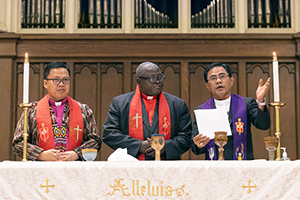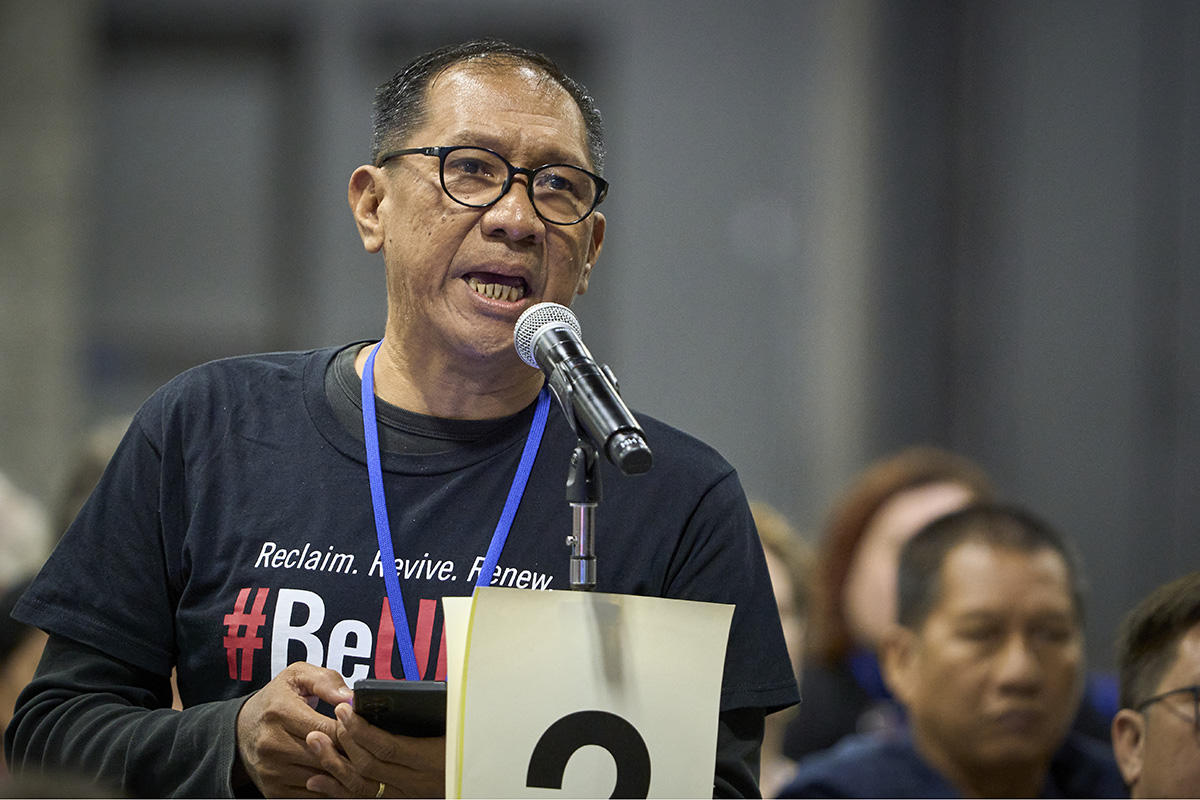Key points:
- “Kairos” is an ancient Greek word that means the right or critical decisive moment.
- Regionalization represents an effort to put the church’s different geographical regions on equal footing — and to make the General Conference less U.S.-centric.
- A traditionalist delegate called regionalization “a way forward for all of us to still stay connected and respected.”
Filipino United Methodists are calling the passing of Worldwide Regionalization legislation a “kairos moment.”
On April 25, the General Conference approved much of the legislation that aims to give The United Methodist Church’s geographic regions equity in decision-making. Delegates voted 586 to 164 for an amendment to the denomination’s constitution that will now go before annual conference voters for potential ratification.
Under regionalization, the denomination's presence in central conferences and the U.S. would become regional conferences, with the same authority to pass legislation for greater missional impact. Regionalization represents an effort to put the church’s geographical regions on equal footing — and to make the General Conference less U.S.-centric.
During the floor debate, the Rev. Jonathan Ulanday, a clergy delegate from the East Mindanao Philippines Conference and a former member of the Christmas Covenant team, implored the body to support the Worldwide Regionalization legislation.
“Worldwide Regionalization is the kairos moment of equity, contextual ministry, simultaneously dismantling the vestiges of colonialism in the structure of the oikos called The United Methodist Church,” he said.
“Kairos” is an ancient Greek word that means the right or critical decisive moment. A kairos moment, Ulanday said, is edification of the mission, relevance and existence of The United Methodist Church in every part of the world.
Subscribe to our
e-newsletter
“This is not a decentralizing power,” he said. “This is placing our Lord as the center of the table. We don’t want anybody but only Jesus Christ. All of us will exist, in equity, equally sharing resources. Spirituality of The UMC will grow in a different context.”
Christine Schneider, a reserve delegate from the Switzerland-France-North Africa Conference and a member of the Standing Committee on Central Conference Matters, said the Worldwide Regionalization proposal was a collective work of United Methodists around the globe. That includes the standing committee, the Connectional Table and members of the Christmas Covenant, a grassroots group of United Methodists in the central conferences who saw regionalization as the best way to promote unity.
Lucille Grace Hilario, lay delegate from the Middle Philippines Conference, said regionalization is a solution for a traditionalist like her.
“This will address the predicament of many churches who were into disaffiliation from The UMC, since most of our congregations are very conservative. I belong to that group who is very traditional, especially in the issue of human sexuality.
“I have faith in God that this is a way forward for all of us to still stay connected and respected,” she said.
Reacting to the vote, the Rev. Benedicto Dulay, a clergy delegate from the Middle Philippines, cited the Episcopal Address given April 24 by South Carolina Bishop L. Jonathan Holston.
“I emphasize what Bishop Holston said: ‘Who we are, who we say we are, who we want to be, and what we are called to be,’” Dulay said. “In regionalization, we can be authorized and empowered in doing mission and other business of our Philippines Central Conference while we are still connected to the whole United Methodist Church.”
Teresa C. Janaban, a lay delegate from Palawan Philippines, said that this is “a positive move of changes from conventional to more adoptable provisions for every region.”
Remy Cortez, lay delegate from the Philippines East Conference, called it “an answered prayer.”
“I am continually praying for God’s guidance for its ratification at the annual conferences,” Cortez said. “Regionalization is close to the autonomy that most of us are looking forward to, and if we really want it to happen in the Philippines, we can start praying, working on it and complying with the due process.”
To be ratified, the amendment will need at least a two-thirds total vote of annual conference lay and clergy voters. Annual conferences are church regions consisting of multiple congregations and other ministries.
The Rev. Dexter Ceballos, clergy delegate from Southern Tagalog Provisional East, is thankful for the plan’s approval. He said its full passage could also safeguard the central conferences, which will become regional conferences, from any issues that are primarily U.S. concerns.
“This is the start of a new form of connectionalism that will further preserve the culture of each region,” Ceballos said.
Ulanday said that a Worldwide Regionalization structure will allow missional or contextual autonomy without losing connectionalism. He noted that because his country, the Philippines, is regularly devastated by natural disasters, the gift of connectionalism has the power to address the needs of people through the United Methodist Committee on Relief. He also noted that the lives of overseas Filipino workers are reached through the United Methodist Board of Global Ministries.
“We are able to feel the presence of our church due to our connectionalism,” he said.
Nissan Pascual, a lay delegate from Rizal Philippines Conference East, said that this is a bold step “for the new and contextualized direction for our beloved” United Methodist Church.
“It acknowledges the colorful differences of traditions, reasons and experiences, providing a broader opportunity to express faith and do effective mission,” Pascual said. “It does not compromise who we are but instead highlights who we are as a connected church. Our calling to these pillars of The UMC faith will continue to unite us and give us direction as regions walk side by side.”

General Conference photos
In a press conference, the Rev. Deanna “Dee” Stickley-Miner, former secretary of the Standing Committee on Central Conference Matters, expressed gratitude for the rich and honest conversations on petitions worldwide.
“Collaboration is celebrated. Voices are heard. Central conferences are now on the stage,” she said, adding that a conversation can now begin on mission and ministry around the world, upholding accuracy and clarity of information.
Bishop Tracy Smith Malone, the incoming president of the Council of Bishops, said she appreciates collaborative spirits that signify readiness for the way forward.
“This assembly clearly shows that the church is ready to embrace a new way forward,” she said. “It decenters the U.S. but dismantles colonialism.”
The Rev. Egmedio Equila Jr., a clergy reserve delegate from the South Nueva Ecija Philippines, said that this will be the right way forward and “will also give us voice as Filipino United Methodists and equal rights with others.”
Rommel B. Montiel, a lay delegate from East Mindanao Philippines, affirmed that Worldwide Regionalization is beyond the contextualization of discipline, mission and ministries. “It is about preserving the unity and integrity of the church, upholding the heritage of our ancestors, maintaining that gift of connectionalism, strengthening interracial, cross-gender, inclusive human relationships and sustaining the United Methodist traditions,” Montiel said.
Ulanday said he believes in the bright future of the denomination.
“I believe that the values upon which Worldwide Regionalization is rooted will give renewed life, strength and vitality,” he said. “The power and authority vested on the regions in making its own rules and regulations is tantamount to allowing seeds of UMC spirituality to flourish and grow vigorously in its respective region or country.”
Mangiduyos is a UM News correspondent in the Philippines.
News media contact: Julie Dwyer at (615) 742-5470 or newsdesk@umnews.org. To read more United Methodist news, subscribe to the free Daily or Weekly Digests.




